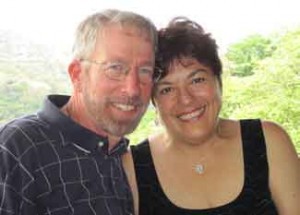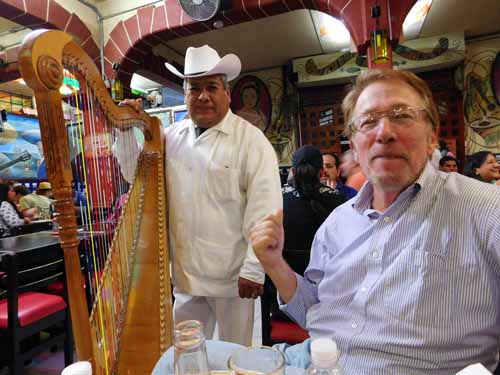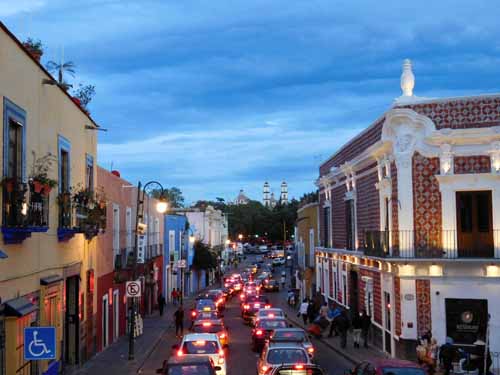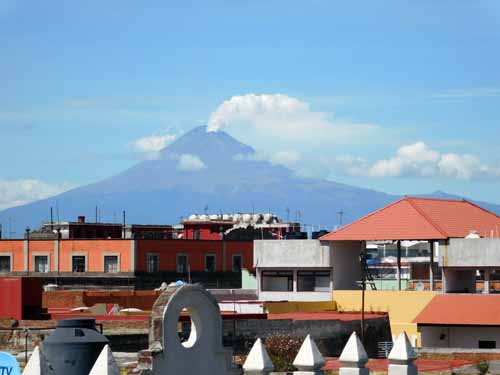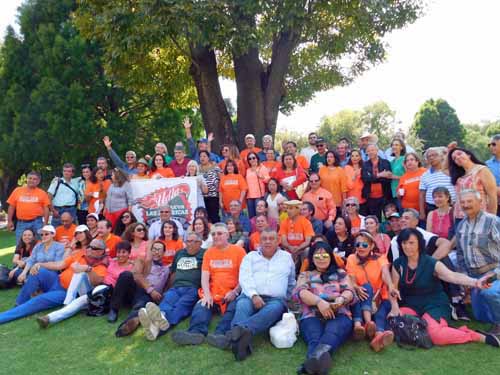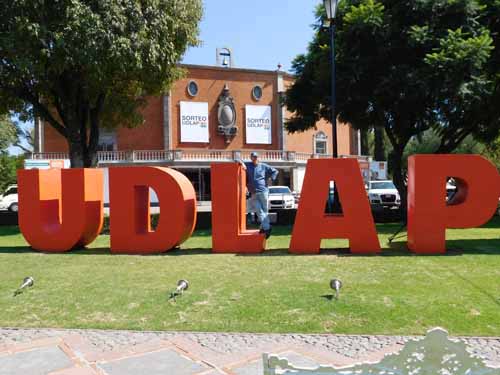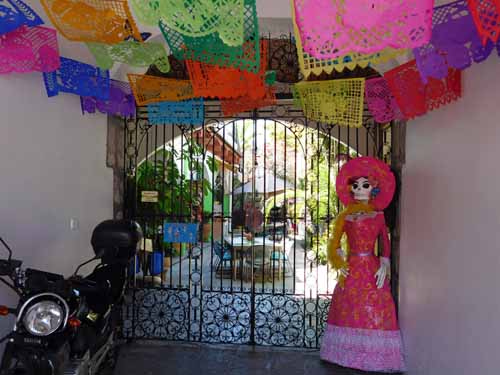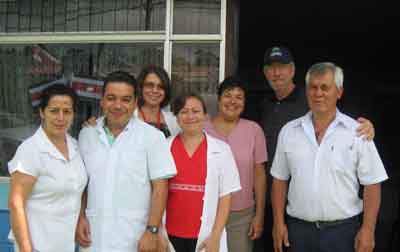Life in CR
Retire for Less in Costa Rica – October 28, 2016
Welcome to our Retire For Less In Costa Rica Newsletter
In This Issue:
Paul and Gloria in Mexico
Paul and I are on our annual trip to Mexico. This year, we are spending time in Mexico City, Puebla, Cholula (for Paul’s University of the Americas reunion) and, now, in Oaxaca. We will resume our regular features (our cost of living and weather articles) when we return in early November. In the meantime, here are a few photos from our trip!
What to Review When Considering Retirement Abroad
by Condor Capital Management (used with permission)
MARTINSVILLE, N.J., June 21, 2016 (GLOBE NEWSWIRE) — The idea definitely has its merits: Move abroad to a beautiful place and live for a fraction of what it would cost to retire in the United States, especially in light of increasing life expectancies and costs of living. Mexico, Costa Rica, Panama, Spain, and Thailand are all popular retirement destinations for Americans not only because of their temperate climates, but also for their marginal costs when compared to the United States.
 Experts cite the Internet as a major catalyst for this trend, allowing folks considering the move to do more research and connect with expats who have already made the decision to spend their golden years in a foreign country. With that said, Ken Schapiro of Condor Capital Management still preaches the importance of actually taking an extended trip to the location in question to accurately assess whether it can be a viable option. That being said, more and more Americans are electing to ultimately move out of the country.
Experts cite the Internet as a major catalyst for this trend, allowing folks considering the move to do more research and connect with expats who have already made the decision to spend their golden years in a foreign country. With that said, Ken Schapiro of Condor Capital Management still preaches the importance of actually taking an extended trip to the location in question to accurately assess whether it can be a viable option. That being said, more and more Americans are electing to ultimately move out of the country.
But before you decide to settle in San José, Costa Rica instead of San Jose, California, Schapiro suggests focusing on the following areas when deciding whether or not it is in your best interest to retire abroad.
Safety
Obviously, some places abroad might not enjoy the level of safety that you have become accustomed to in the United States. As retirement should be a time of relaxation with little added stress, the last thing you want to do is relocate to an area laden with crime and danger.
The U.S. Department of State also publishes safety information, so be sure to use this resource when beginning your assessment of the best place to move to. In general, be aware of the country’s political and socioeconomic conditions, as you should put off to moving to any potentially volatile areas. In the end, while no area can be completely crime-proof, the best course of action in regards to safety might just be reaching out to another American living in the specific area that you are considering a move to.
Medical Care
First and foremost, you want to confirm the quality of the medical care provided in the country you’re considering to retire in. If the quality passes your test, how would you pay for the care? Medicare and many American insurance policies do not cover treatments outside of the United States, though you may wish to inquire about a high-deductible policy for the major medical expenses.
Most likely, you will have to purchase an insurance plan native to the country or pay out-of-pocket for any medical expenses. While the quality of medical care abroad might be comparable to care here in the United States, even minor procedures have the potential to accumulate into significant bills. It is especially important for those with chronic health issues to research treatment costs that are most likely to impact them when making a move abroad.
Keep in mind that in order to be classified as a resident of another country, you have to maintain residence there for at least 330 days of the year. That said, even though foreign residents are not required to have health insurance as mandated by the Affordable Care Act, many expats choose to pay into Medicare so that they can come back into the United States for treatment if need be.
Language
Even though English is spoken by people in most corners of the world, it is still in your best interest to have a basic proficiency in the country’s native language if it’s not English. Even if you are moving to the United Kingdom, there are likely to be quirks and certain differences that exist between different dialects. Remember that you are going to be living abroad, not going on an extended vacation. So, while little to no proficiency of the native language might be adequate for a vacation where you are likely to be catered to by English-speaking staff, such little command of the native language will hardly be enough when visiting the market to purchase groceries or taking a trip to the bank for a simple financial transaction.
Taxes
Regardless of where you decide to move abroad, if you remain a U.S. Citizen and earn money, the tax man will still want his share from you. That said, for the 2015 tax year, the maximum exclusion went up to $100,800 per qualifying person. Note that this is completely independent to any local and federal taxes you may have to pay in the country that you move to. The only way you can get out of paying American taxes is if you renounce your American citizenship – something that a growing number of expats have been doing.
All-in-all, Schapiro notes that retiring abroad can definitely kick off an exciting new chapter in your life. Just be sure to thoroughly go over all of your own requirements and cross reference them with the location abroad that you are looking to retire in. Be sure to be thorough and deliberate with your decision-making process because the last thing you want is to be stressed out during retirement….or waste sufficient time and money to make the move abroad and then return because you didn’t fully do your homework in the first place.
For market updates and Condor Capital’s thoughts on other interesting topics, be sure to check out our blog.
Condor Capital Management
Founded in 1988, Condor Capital Management is an employee-owned, SEC-registered investment advisor based in Martinsville, N.J. employing 16 professional and support staff. Since Condor is a fee-only investment management firm, its fees are based on portfolio size, not sales commissions or number of trades. For more information on Condor Capital Management, please visit http://www.condorcapital.com or call 732-356-7323.
Contact: Ken Schapiro, [email protected]
SOURCE Condor Capital Management
Related Articles:
In the Mailbag: What Folks Gave Up to Move to CR, Why Retire Abroad, and Crime
 We always get lots of responses and questions from readers, both newsletter subscribers and on facebook. Here are a few notes we received in our mailbag.
We always get lots of responses and questions from readers, both newsletter subscribers and on facebook. Here are a few notes we received in our mailbag.
In response to an article written for us by Rob Evans, “What Does It Cost You NOT to Move to Costa Rica?” we received the following comments.
Philip F. wrote:
Gave up being around my family. Gave up fine dining and sporting events. Gave up BBQing or using the smoker every weekend. Now like once a month. Gave up owning multiple vehicles. Most of all, gave up riding my Harley with my brothers! What it worth it? Sometimes I wonder.
Frank F. wrote:
Lots of money. Costa Rica is very expensive. We are Canadians and lived in Panama because it was affordable. We went to Costa Rica while we were waiting for our visa for 3 days and it was the equivalent to a month in El Valle de Anton Panama.
Maria wrote:
The hardest three things for me living here, so you could say that is what I had to give up: Humane treatment of animals, especially all domesticated animals, access to live music, cultural events that I love, and lack of concern for environment, i.e. litter, erosion, loss of habitat, raw sewage, etc. With all that being said, I have no plans to move back. Lots of great things too. But the aforementioned really bother me A LOT.
Nel C. responded:
We knew exactly what it was like. We’d been coming here for 15 years before we moved here. No sacrifice… I’d just like to see more recycling here (Walmart just closed all its recycling centers) and people treating animals better than they do now. Much worse then. I’m just doing what I can by example.
Other comments were more positive and in keeping with the spirit of the article. Molly K. wrote:
Gave up a sense that life was over at 42. Gave up exhaustion. Gave up thinking I’d have to work forever just to pay for my medical coverage. Gave up thinking that it was a crazy zany bird-brain idea to move to another country. Gave up thinking that I have to live according to someone else’s rules. Gave up thinking I couldn’t afford it.
Love it Molly!
![]() Paul posted our article, “Five Good Reasons to Consider Retiring Abroad” and made the comment that “we think America is No Place to Get Old In.” Not everyone agreed with us, and that’s okay.
Paul posted our article, “Five Good Reasons to Consider Retiring Abroad” and made the comment that “we think America is No Place to Get Old In.” Not everyone agreed with us, and that’s okay.
David Y. wrote:
I repeat myself here, but the “America is no place to grow old in” is a gross over generalization. You could easily make the same statement about Costa Rica for a health impaired North American. Everyone’s circumstances differ to some degree, but there are 10’s of millions of aging baby boomers doing quite well in North Americans. That a good thing for Costa Rica, because if they all went south, they would out number Tico’s 10 to 1.
Annie L. commented:
A realistic article that offers an excellent alternative! Even though this is comparing to retirement in the US, most of the concepts still applies to Canada. Even though we have universal health care in Canada (paid via income tax), there is a long waiting list for non-emergency care and referrals to specialists ( somewhat like the Caja system here). It is becoming more difficult to retire gracefully on a limited government pension! Other than the economic factor mentioned in this article, availability of fresh produce and friendly environment certainly make retirement here more attractive. We do more “living” and less “worrying” here!
And, finally, Jean Z. wrote:
We bought property in Costa Rica, under $150,000 4 years ago. We generally spend 6 months there. We have residency and can apply for permanent residency this year. We do not have a car and find the local buses are just fine and we ride free with pensionado residency. We may live there full time this year. We live on about half the cost of the US. We pay into the local health care but have not used it. A visit to the local family physician is $40. Cheaper than paying supplemental insurance. Our US Medicare supplement covers us out of the US for emergencies.We may be living there full time this next year.
![]() In a recent posting of one of our crime articles on facebook, we received the following comments.
In a recent posting of one of our crime articles on facebook, we received the following comments.
Denise M. wrote:
Hi neighbor… we are from Harford County Maryland. Just bought a place in Samara and for now a rental till we retire. I have no misconception about crime. Between the drugs and poverty you just have to be careful of theft. I am thankful that so far in Costa Rica you don’t hear of 4 or 5 murders a day. Turn on Maryland news and it is so sad.”
Kathy C. wrote:
The 2008 homicide rate in the US was 5.2/100,000 while Costa Rica was 8.2/100,000. That was the most current I found, but it sure “seems” higher in the US. I live in Puerto Viejo de Limon.
Brad B. replied:
It also “seems” higher in the US as the media focuses on murder, crime and bad things. The old media saying is quiet true “If it bleeds it leads” (the headlines that is).
Related Articles:
- Read all of our In the Mailbag columns at this link.
TED Talks: A Small Country with Big Ideas to Get Rid of Fossil Fuels
How do we build a society without fossil fuels? Using her native Costa Rica as an example of positive action on environmental protection and renewables, climate advocate Monica Araya outlines a bold vision for a world committed to clean energy in all sectors.
(NOTE from RFLCR: This is just one of the many reasons we are proud to live in Costa Rica!)
![]()
Our Ultimate CR Healthcare Tour
We are proud to offer the Ultimate Healthcare Tour of Costa Rica. When asked what he liked best about our healthcare tour, one of our guests wrote, “the wide variety of places we saw, the experts that Paul  arranged for us to meet and talk with, and an emphasis on all aspects of health, not just doctors and hospitals. Mental health is just as important as physical, if not more so.”
arranged for us to meet and talk with, and an emphasis on all aspects of health, not just doctors and hospitals. Mental health is just as important as physical, if not more so.”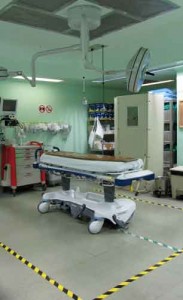
We’ve lived in Costa Rica for over seven years and have used the Caja, Costa Rica’s public healthcare system extensively, as well as the private system, when needed. We’ve learned the system and have been referred up the ladder to see specialists in the maze that is the Caja system. Gloria’s even had surgery here.
Our blend of personal insights and on-the-ground experience combines to answer your questions about whether or not Costa Rica’s healthcare system could meet your individual needs.
But, while it is focused on healthcare, you will learn a lot more about living and retiring in Costa Rica’s Central Valley. Most of the second day of the tour takes place in the town of San Ramón where we live and use the services. And you will come to our home for lunch that day to listen to two presentations.
Our tour is designed to save you both time and money, packing a lot of information into a short period of time. Our goal is to show you the possibilities and to try to demystify Costa Rica’s healthcare system. Our tour lasts two days and 1 night and includes lodging, transportation, meals and non-alcoholic beverages.
Sample Itinerary
You’ll visit:
- At least two private hospitals in San Jose area
- Hospital Mexico, the largest and best public hospital (they even do open heart surgeries there)
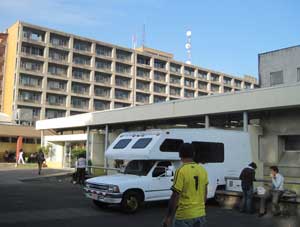
- An insurance broker for a presentation on the various supplemental health insurance options, including public, private, and international plans
- A senior living retirement community
- CPI language school for a presentation about how learning Spanish increases your options for healthcare and some basic medical Spanish.
- Our local hospital here in San Ramón
- A local EBAIS (community clinic)
- The office of our dentist in San Ramón
- A local Seguro Social office where you would sign up for the Caja (national healthcare coverage)
- A pharmacy
- A local feria (farmer’s market) where you will see the abundance of fresh food available.
- The local Cruz Roja (Red Cross) to learn about their services and programs.
- A health food store (macrobiotica), and more!
You’ll learn:
- If the Costa Rican healthcare system could meet your needs and put your mind to rest, once and for all, about this sensitive subject.
- About the public system and how it works, about the private healthcare system, and how you can use a combination of both to your advantage.
- About the EBAIS – where healthcare starts in Costa Rica.
- Approximately how much you would pay for Caja.
- About medical tourism in Costa Rica.
- About home health care in Costa Rica.
Prices: $650 for a couple, $550 for a single.
Please contact us if you are interested in booking a tour. Space is limited.
Related Articles:
- Paul Gets a CAT Scan Through the Caja
- Integration 102 – Speaking Up at the Hospital
- Waiting to See the Doctor, by Jo Stuart
 Facebook, Twitter, & YouTube
Facebook, Twitter, & YouTube
![]()
![]()
![]() You can now follow us on Facebook and Twitter, so please “like” us on Facebook, “follow” us on Twitter, and watch and share our videos on YouTube.
You can now follow us on Facebook and Twitter, so please “like” us on Facebook, “follow” us on Twitter, and watch and share our videos on YouTube.
What’s New on the Website
Check out our newest posts on www.retireforlessincostarica.com:
- In the Mailbag: Bringing Pets, Getting Residency, and INS Insurance
- Our 2016 Costa Rica Healthcare Plan, by Rob Evans
- Our September 2016 Costa Rica Cost of Living
- Costa Rica Weather–July 2016 Observations, Facts, & Tidbits
- Costa Rica Weather–August 2016 Observations, Facts, & Tidbits
- Costa Rica Weather Report: 2016 Monthly Temps & Rainfall
- Gardening in Costa Rica With Steve – Growing Garlic
- Getting Married (Again) in Costa Rica
- Our 2015 Annual Cost of Living in Costa Rica Summary

